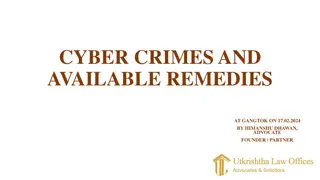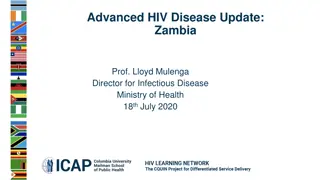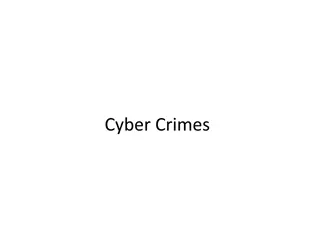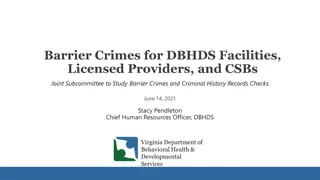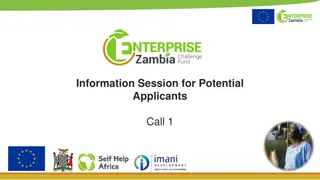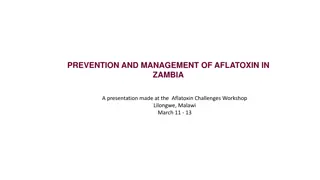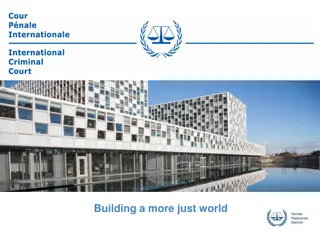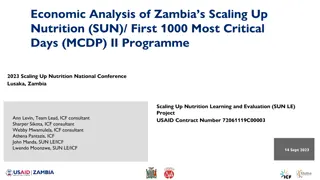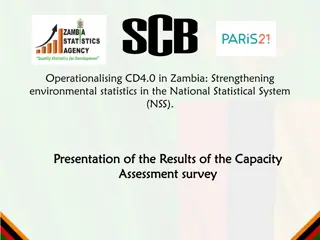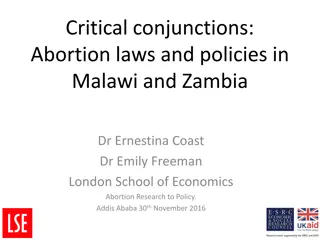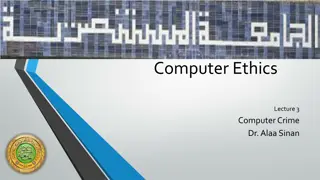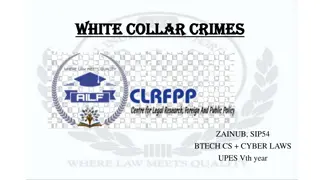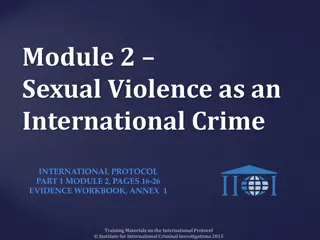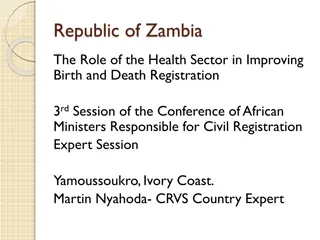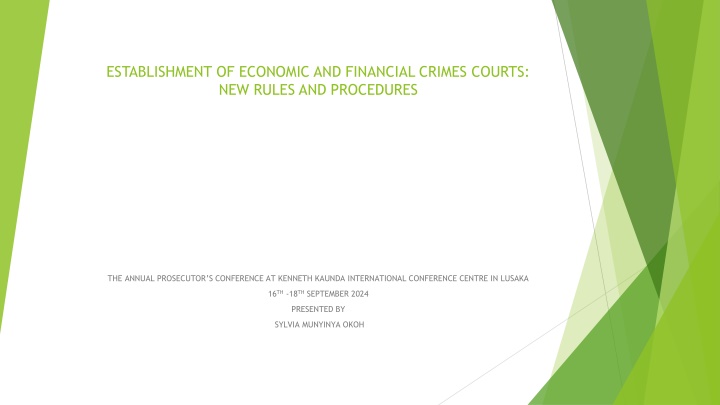
Economic and Financial Crimes in Zambia
The establishment of Economic and Financial Crimes Courts in Zambia is outlined in the new rules and procedures presented at the annual prosecutor's conference. The definition of economic and financial crimes, legislation governing such offenses, and common offenses that constitute them are discussed in detail. Various laws, including the Penal Code Act and other legislative frameworks, address these crimes to prevent corruption, tax evasion, money laundering, and other illicit activities.
Download Presentation

Please find below an Image/Link to download the presentation.
The content on the website is provided AS IS for your information and personal use only. It may not be sold, licensed, or shared on other websites without obtaining consent from the author. If you encounter any issues during the download, it is possible that the publisher has removed the file from their server.
You are allowed to download the files provided on this website for personal or commercial use, subject to the condition that they are used lawfully. All files are the property of their respective owners.
The content on the website is provided AS IS for your information and personal use only. It may not be sold, licensed, or shared on other websites without obtaining consent from the author.
E N D
Presentation Transcript
ESTABLISHMENT OF ECONOMIC AND FINANCIAL CRIMES COURTS: NEW RULES AND PROCEDURES THE ANNUAL PROSECUTOR S CONFERENCE AT KENNETH KAUNDA INTERNATIONAL CONFERENCE CENTRE IN LUSAKA 16TH-18THSEPTEMBER 2024 PRESENTED BY SYLVIA MUNYINYA OKOH
DEFINITION OF ECONOMIC AND FINANCIAL CRIME The Criminal Procedure Code (Economic and Financial Crimes Court) Rules, 2024 provides that economic and financial crime has the meaning assigned to the words in the Economic and Financial Crimes (Division of Court) Order, 2022. The said Order was amended by the Economic and Financial Crimes (Division of Court) (Amendment) Order, 2023 which defines Economic and Financial Crimes in Order 1A as: an omission or non-violent unlawful act by a person which leads or may lead to financial loss or illegal gain, either individually or in a group in violation of the law governing economic activity in the Republic. The Eleventh United Nations Congress on Prevention of Crime and Criminal Justice offers the following definition: The term economic and financial crime refers broadly to any non-violent crime that results in a financial loss, even though at times such losses may be hidden or not socially perceived as such Europol defines it as: Economic crime, also known as financial crime, refers to illegal acts committed by an individual or a group of individuals to obtain a financial or professional advantage. The principal motive in such crimes is economic gain. From the definitions, it is clear that economic and financial crimes cover a wide range of offences where perpetrators obtain an economic gain or advantage.
LEGISLATION ON ECONOMIC AND FINANCIAL CRIMES The Penal Code Act, Chapter 87 of the Laws of Zambia, is the primary legislation outlining conduct that constitutes criminal offences in the Republic. However, certain behaviours deemed criminal are also addressed in other laws. Economic and Financial offences, for instance, are not confined to the Penal Code but are strewn across various legislative frameworks, including but not limited to the following: The Anti-Corruption Act No. 3 of 2012; The Forfeiture of Proceeds of Crime Act No. 19 of 2010; The Prohibition and prevention of Money Laundering Act No.14 of 2010; and The Excise and customs Act.
Cont.. Legislation on Economic and Financial crimes These additional laws regulate specific sectors and activities, extending the legal scope for addressing Economic and Financial crimes beyond the Penal Code. There is no classification of Economic and Financial offences in the Penal Code as is the case with other offences that are categorized in various parts. This possess a difficulty in distinguishing these cases from other cases at first glance. It falls to the allocating court to discern whether a case falls within the realm of Economic and Financial crime or other cases, relying on the legal definition to make this distinction.
COMMON OFFENCES THAT CONSTITUTE ECONOMIC AND FINANCIAL CRIMES Corruption practices; Tax evasion; Money laundering; Theft (by public servant); Abuse of authority of office; Willful failure to comply with laid down procedure or guidelines; Possession of property reasonably suspected to be proceeds of crime.
ESTABLISHMENT OF ECONOMIC AND FINANCIAL CRIMES DIVISION IN THE SUBORDINATE COURT Following the establishment of the EFCC Division of the High Court in 2022, as was the case with Gender Based Violence and cases of children in conflict with the law, a cohort of magistrates in the Subordinate court, being the court of first instance in most criminal cases, were assigned administratively to hear Economic and Financial crimes for purposes of specialization and fast-tracking of cases. In 2023, the Chief Justice of the Republic created the Economic and Financial Crimes Division in the Subordinate Court by Section 3A of the Subordinate Court Amendment Act No.23 of 2023 The Division was established to hear and determine matters relating to economic and financial crimes and corruption
SITTING OF THE COURT The court sits in Sessions which are gazetted according to Sittings in the Subordinate Court as regulated by Section 25A of the Subordinate Court Act amended by the Subordinate Court Amendment Act No.23 of 2023
THE NEW RULES AND PROCEDURE The procedure before the court is principally governed by: The Criminal Procedure Code, Chapter 88 of the Laws of Zambia (CPC); and The Criminal Procedure Code (Economic and Financial Crimes Court) Rules, 2024 (EFCCR). The Rules were established under Section 358A of the Criminal Procedure Code (CPC), which grants the Chief Justice the authority to create rules governing the procedures for the hearing and determination of specific classes of offences in the courts. The Rules came into effect on 1st March 2024.
Filing of the charge sheet and service Rule 4: mandate a prosecutor filing a charge in the criminal registry to file a list of witnesses, witness statements, and copies of documents intended to be produced in evidence. Rule 5(1): specifies that within fourteen days of filing the charge sheet, the list of witnesses, witness statements, and documents must be served on the accused person or their advocate. Rule 5(2): an affidavit of service has to be filed within two days of service of documents Rule 5(4): a document or witness statement not served may not be relied on at trial. Rule 5(5)> a person not named in the list of witnesses cannot testify
Cont. filing of the charge sheet and service Rule 5(6): (a) leave of court may be sought to disclose a document or witness statement which was not available at the time of filing (It is insufficient to merely assert that the document was unavailable; the prosecution must demonstrate to the satisfaction of the court that the document or statement could not have been obtained at the time of filing.) (b) Leave of court may be sought to amend a list of witnesses or call an additional witness Rule 5(7): where leave is granted, the defence should be given an opportunity to examine the documents filed.
Pre-trial Conference Rule 6(1): within 7 days of filing the affidavit of service, the parties have to be called for a pre-trial conference. Rule 6(2): sets out issues for consideration during the conference such as consent to prosecute, time table for progress and date of plea. Rule 6(3): after the pre-trial conference, the court gives directions on when trial will commence and the duration of prosecution s case.
The Trial Predominantly, the procedure in the CPC applies Rule 11: the court has to respect due process and ensure a fair trial Rule 13: an accused person or witness can attend or give evidence through video-audio conferencing
Adjournments Rule 10 : Adjournments will be granted only in exceptional circumstances with compelling justification.
Abridgment of time Rule 9: court can abridge or extend time for taking any step
Appeal on interlocutory applications Rule 12: a decision in an interlocutory application cannot be appealed against. Issues out of interlocutory applications can be raised at appeal of the judgment
Submissions Rule 14: the filing of submissions
Ruling on case to answer Section 207 CPC require the court to find out whether the accused person is calling witness. With the introduction of the new rules, that issue should be addressed during the status conference.
Disclosure of documents by the defence Rule 7 (1) : within 14 days of the accused person being found with a case to answer, the accused must file and serve on the prosecution the documents they intend to rely on. Rule 7(2): accused to serve the prosecution within two days of filing and file an affidavit of service Rule 7(3): Documents not filed and served cannot be relied on save with leave of court. Rule 7(4) : Documents not disclosed during the pre-defence conference may still be admitted into evidence if they were unavailable at the time or if it serves the interests of justice. There is no requirement for the accused person to file witness statements.
Pre-defence conference Rule 8 (1): Provides for the pre-defence conference to be held within 7 days of filing the affidavit of service to determine inter alia : Compliance with R7 (Rule 8(2) Number of witnesses (Rule 8(2) Rule 8 (3): The court has to issue directions on the commencement and duration of the defence.
Transitional provision Rule 17: Trials already in progress when the rules took effect are considered to have been commenced under the new rules Discovery must take place (no trial by ambush under the Rules) status conference must be convened
Issues It is crucial to remain mindful of the timeline within which cases must be determined as they progress; manage the size of the case and number of counts due to time limit for the trial; studying of indictments before filing to avoid substitution and amendments; old cases should be cause listed in consultation with the court to avoid overload; The allocation process should ensure that the prosecutor s caseload is manageable, allowing sufficient time for thorough preparation, timely filing of documents, and adherence to legal deadlines; Preparation for trial which allows clear and efficient presentation of a case. Helps avoid last-minute surprises, and ensures that the trial proceeds smoothly, adhering to legal timelines Streamline the case by focusing on key issues to avoid overwhelming the process by calling relevant witnesses and consolidating charges; Laying of evidentiary foundation for production of exhibits Responding to objections adjournments/unavailability of witnesses THANK YOU

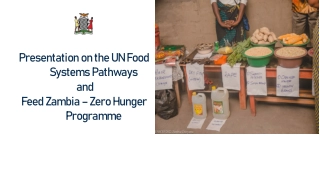

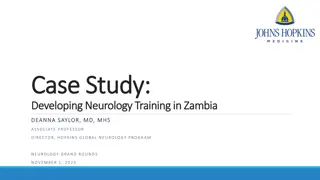
![Prevention and Combating of Hate Crimes and Hate Speech Bill [B.9B.2018]](/thumb/60513/prevention-and-combating-of-hate-crimes-and-hate-speech-bill-b-9b-2018.jpg)


